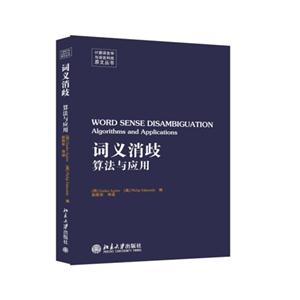-
>
妙相梵容
-
>
基立爾蒙文:蒙文
-
>
我的石頭記
-
>
心靈元?dú)馍?/p>
-
>
女性生存戰(zhàn)爭(zhēng)
-
>
縣中的孩子 中國(guó)縣域教育生態(tài)
-
>
(精)人類(lèi)的明天(八品)
詞義消歧算法與應(yīng)用 版權(quán)信息
- ISBN:9787301249536
- 條形碼:9787301249536 ; 978-7-301-24953-6
- 裝幀:一般膠版紙
- 冊(cè)數(shù):暫無(wú)
- 重量:暫無(wú)
- 所屬分類(lèi):>
詞義消歧算法與應(yīng)用 本書(shū)特色
《詞義消歧---算法與應(yīng)用(英文影印版)》是"計(jì)算語(yǔ)言學(xué)與語(yǔ)言科技原文叢書(shū)"中的一冊(cè)。對(duì)于計(jì)算機(jī)來(lái)說(shuō),要理解人類(lèi)語(yǔ)言就必須消除歧義,在計(jì)算語(yǔ)言學(xué)領(lǐng)域,詞義消歧(word sense disambiguation,簡(jiǎn)稱(chēng)wsd)一直是研究者探索的內(nèi)容。本書(shū)是近年來(lái)國(guó)際學(xué)術(shù)界關(guān)于詞義消歧研究成果的一部集成之作。幾乎覆蓋了詞義消歧研究各個(gè)題目,具有重要學(xué)術(shù)價(jià)值。
詞義消歧算法與應(yīng)用 內(nèi)容簡(jiǎn)介
《詞義消歧---算法與應(yīng)用(英文影印版)》是**本全面探討詞義消歧的書(shū),對(duì)于重要的算法、方式、指標(biāo)、結(jié)果、哲學(xué)問(wèn)題和應(yīng)用,都有涉略,并有這個(gè)領(lǐng)域的權(quán)威學(xué)者對(duì)本領(lǐng)域的歷史及發(fā)展所做的較為全面的綜述。研究者可以從本書(shū)了解到本領(lǐng)域的成果和發(fā)展趨勢(shì),開(kāi)發(fā)人員可以從本書(shū)了解一些技術(shù)和方法。
詞義消歧算法與應(yīng)用 目錄
導(dǎo)讀
contributors
foreword
preface
1 introduction
eneko agirre and philip edmonds
1。1 word sense disambiguation
1。2 a brief history of wsd research
1。3 what is a word sense?
1。4 applications of wsd
1。5 basic approaches to wsd
1。6 state-of-the-art performance
1。7 promising directions
1。8 overview of this bok
1。9 further reading
references
2 word senses
adam kilgarriff
2。1 introduction
2。2 lexicographers
2。3 philosophy
2。3。1 meaning is something you do
2。3。2 the fregean tradition and reification
2。3。3 two incompatible semantics?
2。3。4 implications for word senses
2。4 lexicalization
2。5 corpus evidence
2。5。1 lexicon size
2。5。2 quotations
2。6 conclusion
2。7 further reading
acknowledgments
references
3 making sense about sense
nancy ide and yorick wilks
3。1 introduction
3。2 wsd and the lexicographers
3。3 wsd and sense inventories
3。4 nlp applications and wsd
3。5 what level of sense distinctions do we need for nlp, if any?
3。6 what now for wsd?
3。7 conclusion
references
4 evaluation of wsd systems
martha palmer, hwee tou ng and hoa trang dang
4。1 introduction
4。1。1 terminology
4。1。2 overview
4。2 background
4。2。1 wordnet and semcor
4。2。2 the line and interest corpora
4。2。3 the dso corpus
4。2。4 open mind word expert
4。3 evaluation using pseudo-words
4。4 senseval evaluation exercises
4。4。1 senseval-1
evaluation and scoring
4。4。2 senseval-2
english all-words task
english lexical sample task
4。4。3 comparison of tagging exercises
4。5 sources of inter-annotator disagreement
4。6 granularity of sense: groupings for wordnet
4。6。1 criteria for wordnet sense grouping
4。6。2 analysis of sense grouping
4。7 senseval-3
4。8 discussion
references
5 knowledge-based methods for wsd
rada mihalcea
5。1 introduction
5。2 lesk algorithm
5。2。1 variations of the lesk algorithm
simulated annealing
simplified lesk algorithm
augmented semantic spaces
summary
5。3 semantic similarity
5。3。1 measures of semantic similarity
5。3。2 using semantic similarity within a local context
5。3。3 using semantic similarity within a global context
5。4 selectional preferences
5。4。1 preliminaries: learning word-to-word relations
5。4。2 learning selectional preferences
5。4。3 using selectional preferences
5。5 heuristics for word sense disambiguation
5。5。1 most frequent sense
5。5。2 one sense per discourse
5。5。3 one sense per collocation
5。6 knowledge-based methods at senseval-2
5。7 conclusions
references
6 unsupervised corpus-based methods for wsd
ted pedersen
6。1 introduction
6。1。1 scope
6。1。2 motivation
distributional methods
translational equivalence
6。1。3 approaches
6。2 type-based discrimination
6。2。1 representation of context
6。2。2 algorithms
latent semantic analysis (lsa)
hyperspace analogue to language (hal)
clustering by committee (cbc)
6。2。3 discussion
6。3 token-based discrimination
6。3。1 representation of context
6。3。2 algorithms
context group discrimination
mcquitty's similarity analysis
6。3。3 discussion
6。4 translational equivalence
6。4。1 representation of context
6。4。2 algorithms
6。4。3 discussion
6。5 conclusions and the way forward
acknowledgments
references
7 supervised corpus-based methods for wsd
8 knowledge sources for wsd
9 automatic acquisition of lexical information and examples
10 domain-specific wsd
11 wsd in nlp applications
- >
我從未如此眷戀人間
- >
伊索寓言-世界文學(xué)名著典藏-全譯本
- >
有舍有得是人生
- >
回憶愛(ài)瑪儂
- >
苦雨齋序跋文-周作人自編集
- >
自卑與超越
- >
唐代進(jìn)士錄
- >
山海經(jīng)

















